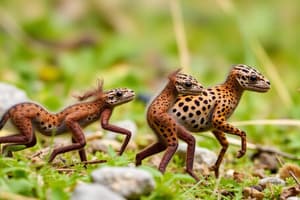Podcast
Questions and Answers
What is coevolution?
What is coevolution?
- A pattern of one species evolving in response to a genetic change in another species
- The process where two species never interact or adapt to each other
- A pattern of reciprocal adaptation caused by two species evolving in close association (correct)
- The change in genetic composition of an individual species over time
What does the presence of a parasite on a host NOT constitute evidence for?
What does the presence of a parasite on a host NOT constitute evidence for?
- Coevolution (correct)
- Symbiosis
- Conflict between species
- Mutualism
Why may parasites evolve rapidly compared to other species?
Why may parasites evolve rapidly compared to other species?
- Stable environments and low mutation rates
- Short generation times and high fecundity (correct)
- High predation pressure and low genetic diversity
- Long generation times and low fecundity
What is a requisite for coevolution between interacting species?
What is a requisite for coevolution between interacting species?
Why is it sometimes difficult to determine if plants' secondary compounds arose for preventing herbivores from eating plant tissue?
Why is it sometimes difficult to determine if plants' secondary compounds arose for preventing herbivores from eating plant tissue?
What does the text emphasize as not synonymous with coevolution?
What does the text emphasize as not synonymous with coevolution?
What is the central problem in coevolutionary studies?
What is the central problem in coevolutionary studies?
In coevolution, if the presumed reciprocally induced traits evolve in the plant host before the insect becomes associated with it, what do we not call it?
In coevolution, if the presumed reciprocally induced traits evolve in the plant host before the insect becomes associated with it, what do we not call it?
What type of interactions do good parasites have with their hosts according to conventional thought?
What type of interactions do good parasites have with their hosts according to conventional thought?
Which of the following is required for coevolution to occur between interacting species?
Which of the following is required for coevolution to occur between interacting species?
What does the classic analogy of the coevolutionary arms race involve?
What does the classic analogy of the coevolutionary arms race involve?
What is an important point to consider regarding the timing of evolution in coevolution studies?
What is an important point to consider regarding the timing of evolution in coevolution studies?
What type of evolution is described as continuous reciprocal evolution between hosts and parasites?
What type of evolution is described as continuous reciprocal evolution between hosts and parasites?
How can isolation of populations impact the local adaptation process between hosts and parasites?
How can isolation of populations impact the local adaptation process between hosts and parasites?
Which factor influences the selection for parasites in host populations?
Which factor influences the selection for parasites in host populations?
How might inbreeding in host populations affect the observation of local adaptation by parasites?
How might inbreeding in host populations affect the observation of local adaptation by parasites?
Which term best describes a scenario where parasite-host relationships evolve to negligible pathogenicity?
Which term best describes a scenario where parasite-host relationships evolve to negligible pathogenicity?
What does coevolution between hosts and parasites lead to?
What does coevolution between hosts and parasites lead to?
Flashcards are hidden until you start studying
Study Notes
Coevolution Overview
- Coevolution refers to the reciprocal evolution of two or more species that interact closely, where changes in one species induce adaptations in the other.
- Coevolution requires interactions that influence evolutionary trajectories and traits of both species.
Evidence and Misconceptions
- The presence of a parasite on a host does not constitute evidence for coevolution; other factors may contribute to the relationship.
- Coevolution is not synonymous with mutualism or any other form of species interaction; it specifically involves reciprocal adaptations.
Parasite Evolution
- Parasites may evolve more rapidly than other species due to their short generation times and high reproductive rates.
- Isolation of populations can enhance local adaptations between hosts and parasites by creating distinct evolutionary pressures.
Secondary Compounds in Plants
- It's challenging to determine whether plant secondary compounds evolved primarily for defense against herbivores because other ecological roles may exist.
Coevolutionary Dynamics
- A prerequisite for coevolution is that traits evolve in response to interspecific interactions; if these traits develop independently, they are not classified as coevolutionary.
- Good parasites tend to maintain a balance with their hosts, avoiding fatal effects that could jeopardize their own survival.
Coevolutionary Arms Race
- The classic analogy for coevolutionary dynamics is the arms race, where evolutionary changes continue to escalate between the two interacting species.
- Important timing considerations in coevolution studies include the sequence and rate of trait changes between hosts and parasites.
Continuous Evolutionary Processes
- Continuous reciprocal evolution between hosts and parasites is termed coevolution, highlighting ongoing adaptations in response to each other's strategies.
- Factors influencing selection for parasites include host population dynamics, environmental conditions, and genetic diversity.
Local Adaptation Observations
- Inbreeding in host populations can obscure local adaptation to parasites because of reduced genetic variability and less adaptive responses.
- The evolution of parasite-host relationships can lead to negligible pathogenicity, where parasites become less harmful to their hosts.
Outcomes of Coevolution
- Coevolution between hosts and parasites can results in sophisticated adaptations, which can enhance both survival and reproductive success in a complex ecological landscape.
Studying That Suits You
Use AI to generate personalized quizzes and flashcards to suit your learning preferences.




